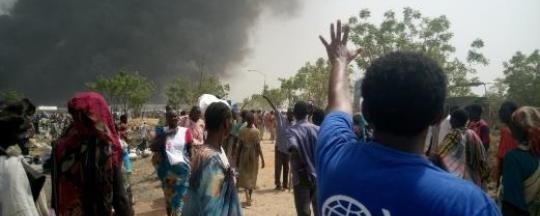An investigation committee commissioned by South Sudan’s President Salva Kiir after violent clashes in the United Nations base in Malakal, Upper Nile state recommended the punishment of top UN officials for not acting promptly to avert the violence.
On 17 and 18 February, violence broke out in the UN camp in Malakal, leaving dozens dead. SPLA soldiers reportedly were involved in the violence, and the UN has been heavily criticized for failing to protect civilians under its care.
“The UNMISS [United Nations Mission in South Sudan] state coordinator and the commander of the forces serving at the time of the incident in Malakal (POC) site should be held accountable for failing to act quickly to prevent the incident from occurring and the for the weak response to the incident as well as not upholding to the UN principle of neutrality and impartiality,” reads the 5 April report, a copy of which was seen by Radio Tamazuj and is linked for download below.
The investigative committee was led by Manasae Lomole Waya, former deputy governor of Central Equatoria state, Prof Aggrey Ayuen Majok of Jonglei state, Munira Abdelwahab Suleiman from Boma, George Justin Achor from Wau, Filberto Mayuot Mareng from Gogrial, as well as two unnamed high ranking military officers.
The report alleged that the UN did not take steps to avert the fighting and presented evidence that they knew violence was imminent before the clashes took place. The report also accused the UN of failing to open a gate to allow fleeing civilians to escape the base.
The report, which attempts to absolve the state authorities of any responsibility, recommends the relocation of members of the internally displaced persons in the protection of civilians site managed by the United Nations mission to their home origins due to the existence of a peace agreement. However, most residents of the UN base are from Malakal town.
“There is an overwhelming desire from any IDPs (internally displaced persons) to leave the protection of civilians site (POC) due to unbearable situation in the camp, hence the UNMISS should be asked to transport the IDPS to their states of origin as there is now relative calm and especially as the government [has embarked] on the implementation of the peace agreement,” the report said.
The 20-page report was based on interviews with state officials and various community leaders and others in Malakal. The investigative committee did not interview anyone from UNMISS, nor did they enter the base to interview those sheltering inside because UNMISS would not let them in, the report said.
The report claimed that the clashes started when Shilluk and Nuer youth attacked Dinka civilians inside the UN base. It said AK-47s, PKM light machine guns, and rocket propelled grenade launchers had been smuggled into the base. The report did not mention involvement of SPLA soldiers in the incident.
A total of 21 Dinka people were killed in the attack, with four missing, while eight Nuer or Shilluk people were killed, as well as five Sudanese nationals, according to the report.
Discrepancies with other reports
The government’s investigation report conflicts with various independent descriptions of the violence.
For instance, a report by the respected research group Small Arms Survey said the violence in the base was a planned attack by SPLA soldiers as part of a concerted campaign by Dinka in Upper Nile to remove Shilluk people from Malakal town.
Independent journalists have also presented evidence that the attack involved SPLA soldiers from outside the base firing on civilians inside.
The UN, however, presents conflicting information about the attack. Publicly, the UN has not admitted that SPLA soldiers were definitively involved in the attack, but an internal UNMISS timeline of the incident published by Radio Tamazuj shows that UN peacekeepers actually battled with SPLA troops who were attacking the base.
A separate internal UN report seen by Radio Tamazuj also conflicts with the government’s casualty figures. That report, part of a contingency plan drawn up by UNMISS in case of another outbreak of violence in Malakal, reported: “around 24 Shilluk died as a result of exchange of fire between the two sides during the violence. On the Dinka side, figures provided by the authorities in Malakal town suggest that a total of three Dinkas died.”
CTSAMM violation report missing
The government’s report is the first official investigation into the incident to be made public, but various groups have commenced or completed their own inquiries.
The United Nations is conducting multiple inquiries into what took place in the Malakal, including an investigation from its New York headquarters into UNMISS’ response. The status of these investigations and whether they will be made public is unknown.
Furthermore, CTSAMM, the body tasked by JMEC to monitor ceasefire violations, began investigating the attack in Malakal more than two months ago. However, neither CTSAMM nor JMEC has released that report.
JMEC has released numerous other violation reports this year in a more timely manner so it is unclear why the investigation into the Malakal incident remains either unfinished or unpublished.
Related:
Eastern Nile governor denies instigating Malakal clashes (29 Feb.)
Mass killing at UN protection site in S Sudan (18 Feb.)




